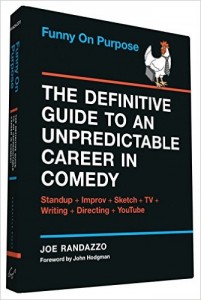You’ve seen so many comedians making it big in the 2010s via stand-up comedy, via Twitter, via YouTube, heck even via Vines and Instagrams. You’ve seen so many comedians writing books about their lives and careers.
But where’s the book that’ll tell you how to make it in comedy?
 Joe Randazzo, former editor of The Onion, and currently head writer of @midnight on Comedy Central, certainly knows what he’s talking about when he spells it out for you in his new book, “Funny On Purpose: The Definitive Guide to an Unpredictable Career in Comedy.” I’d type that even if he didn’t sublet a room in my apartment earlier this year, because he wrote and sold the book even before that!
Joe Randazzo, former editor of The Onion, and currently head writer of @midnight on Comedy Central, certainly knows what he’s talking about when he spells it out for you in his new book, “Funny On Purpose: The Definitive Guide to an Unpredictable Career in Comedy.” I’d type that even if he didn’t sublet a room in my apartment earlier this year, because he wrote and sold the book even before that!
Randazzo’s book includes not only his own knowledge from navigating the worlds of comedy and show business, but also life lessons from the likes of Judd Apatow, Weird Al Yankovic, Terry Jones and the late Joan Rivers — plus several other funny people, too.
This is from Chapter 3 of his book, “Taste & Sensibility, or How Soon is Too Late?”
“An entire industry of outrage has sprung up and thrived in the incubator of the Internet. Every few weeks, someone says or writes something that a vocal segment of the population finds offensive — sometimes justifiably so — and the rest of us are dragged into an intense, hateful, demi-debate. Accusations are leveled! Apologies are demanded! Gilbert Gottfrieds are fired! And the next morning, as we peer through the haze of a self-righteousness hangover, we take stock of what we accomplished and find: just about nothing.
What does it mean to call something off-limits? Where are these limits set and how are they marked? If we can agree that there are some things that do require limits, who decides what those things are, and how did those people acquire this authority? Is it ever okay to make jokes about rape, child molestation, the Holocaust, sexuality, child molestation during the Holocaust, AIDS, someone with AIDS raping a Nazi after learning their child was molested during the Holocaust, or race? The deeper one explores this idea the more one sees that it is diametrically opposed to two primary functions of comedy: to push the bounds of comfort and to challenge authority. Without these two principles — and an important and universal third principle, which is to smear the edges of tragedy with a shared sense of the absurd — one does not have comedy.
Sorry. No more ha-ha.
These topics are sensitive because they exist in the dimmer corners of our culture, in places that we do not want to face. But it’s our job as comedians, satirists and wiseacres to poke at these issues, to get them to squirm around, to take their measure and expose enough surface area to allow the civilian population to judge for itself. Even the crappiest, least-subtle comics have a part to play, since it is often their unwieldy sledgehammer strikes that first crack these things open. To confront some of these off-limit topics, be they religious, moral, economic, or scatalogical, also confronts the unjust structures that prop up those in power and that keep the rest of us down.
I can’t think of anything more offensive than a standup routine based on racism or misogyny — not only because this perpetuates ignorant, socially violent ideas, but because it’s boring. It’s mediocre, and there’s nothing more dangerous than mediocrity. You do not get a pass to be an unequivocal asshole merely because you’re standing onstage with a microphone. It’s about context and intent. Does your joke make a broader point about sexism, or is it just using those boring old tropes for an easy laugh? Are you taking a stand against racism, or are you just being racist? The first category is noble. The second is cowardly.
Lessons in Taste from The Onion
CHOOSE THE RIGHT TARGET
Weirdly enough, the two most sensitive areas among readers when I was at The Onion (AD 2006-2012) were child molestation and the troops. That didn’t mean we could never do jokes about either one; we just had to make sure that the jokes weren’t at the expense of the victim. It was perfectly legitimate to make a joke about Jerry Sandusky, the Penn State football coach who was convicted in 2012 of sexually abusing dozens, maybe hundreds, of children over several decades so long as the joke condemned him, the media, or the university cover-up. To make a joke at the expense of the children or the their families would not only have been in bad taste, it would have been pointless. Likewise, I remember an occasion sometime around 2007 when we were discussing a headline that went something like, “Soldier Just Knows He’ll Be 4,000th Casualty in Iraq.” Then we realized that there actually would be a four-thousandth casualty, and when it happened, the joke would not be about some abstract idea, but about an actual person with friends and family who would be mourning them. We decided not to run it.
DON’T MAKE THE FIRST JOKE, MAKE THE BEST JOKE
One of the great things about The Onion was that it did not always weigh in on every topic right away. Because the editorial process took two weeks from pitch to publication, the jokes tended to have a more timeless quality, and they were often as much about the cultural response to the news as the news itself. Nowadays, The Onion publishes on a daily basis, but it still refrains from stories that it doesn’t have a fresh angle on.
YOU WILL ALWAYS OFFEND SOMEONE
I swear there was a form letter that unhappy Onion readers could download and fill in with their own specifics, and it started like this: “Normally I am a big fan of The Onion and appreciate your humor, but this time you’ve gone too far.” They would then enumerate the ways in which they were personally offended by the joke or jokes that they, personally, did not find funny because it was a topic they were sensitive to, personally. If The Onion is doing its job right, each article should offend at least a thousand people.
SOME PEOPLE WILL HATE YOU
It doesn’t really matter to the offended party what your intention was and ultimately, you cannot fault someone for being annoyed or angered by what you say. That is their right, just as it is your right to offend them. It seems like a balanced equation to me: you are allowed to attack their most sensitive issues, and they are allowed to criticize, complain, and call you names. (Also: it is fun to piss people off!)
IF YOU’RE NERVOUS, YOU’RE ON THE RIGHT TRACK
Sometimes your goal is to push the aforementioned envelope, and that means delving into areas that will make everyone, including yourself, uncomfortable. It is important to follow your gut in such matters, but to distinguish the eternally yucky kind of gut feeling that accompanies something truly tasteless from the sort that emerges naturally from trepidation. I remember feeling this way in 2010, right before The Onion ran a fictional Op-Ed by Rush Limbaugh in response to his terrible remarks that Haitians deserved the recent earthquake that had devastated their country. The column, “I Don’t Even Want to Be Alive Anymore,” essentially called for his assassination because he was too cowardly to kill himself. I was concerned that readers would think he’d gone too far, and that Limbaugh himself might seek legal action. In fact, we got only positive feedback from fans and never heard from Limbaugh.
DON’T BACK DOWN
The Onion has remained independent and beyond reproach for so many years not only because it goes after all targets, but because it has always stayed above the fray. It almost never responds to critics* or comments on its own material, and when it does, it does so in an irreverent, above-it-all tone that deflects the heat back on the questioner. This approach takes strength of will borne out of The Onion‘s editorial voice and anonymity and not many individuals can pull this off. However, if you’ve checked off all your boxes above, built up a reputation for falling on the right side of things, believe in the joke and stand by it, you should have nothing to apologize for.
* There’s only one occasion I can think of in the history of The Onion when the organization officially apologized for a joke, and that was when it Tweeted during the 2012 Academy Awards that nine-year-old actress Quvenzhané Wallis was a cunt. It was a joke that did not go over well in context, and out of context, it sounded monstrous. Many thousands of people, including LaVar Burton and Maya Angelou, were up in arms on social media and the blogosphere (is that still a term people use?). The Onion almost immediately deleted the Tweet, and the next day, CEO Steve Hannah printed a full apology on the front page, where the satire and the jokes are supposed to go. I disagreed with the decision because his response only added fuel to the fire and, moreover, The Onion is one place where nothing is supposed to be off-limits. With the writing of that letter, the limits were set in stone.
From Joe Randazzo’s “Funny On Purpose: The Definitive Guide to an Unpredictable Career in Comedy” (Chronicle Books), reprinted with permission. Copyright © 2015 Joe Randazzo. His book is available now wherever you buy books.
Here are two such places:


